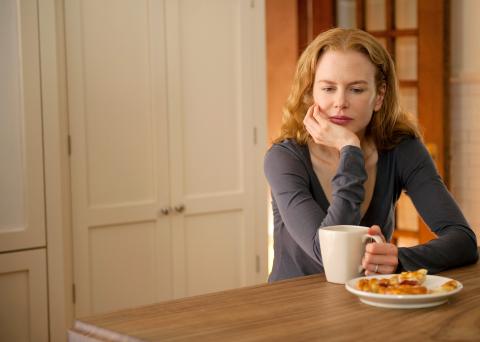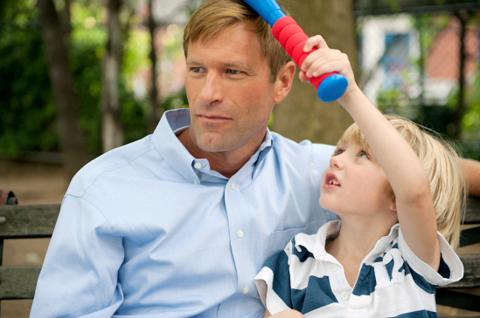Rabbit Hole, a film about a couple coping with the death of their four-year old son, is a finely crafted drama that manages to deal with emotional turmoil in all its multidimensional complexity. The movie balances the abyss of grief against the consoling banalities of everyday life through outstanding performances by leads Nicole Kidman and Aaron Eckhart.
Becca (Kidman) and Howie (Eckhart) search for some semblance of meaning and sense of purpose in their lives eight months after their young son is killed by a car as he ran into the road after the family dog. Kidman has made a specialty of playing brittle women holding whirlwinds of passion within immaculately groomed exteriors, and one of the qualities of Rabbit Hole is that it gives us a glimpse under the surface.
The conversation with her husband about where they are after eight months of grief is mediated through the language of therapy.

Photo Courtesy of CatchPlay
The pair go to weekly group sessions at which couples coping with grief indulge in an orgy of self-indulgent venting. Becca, a tough-minded and goal-oriented professional, whatever her emotional state, finally loses her patience with the conventions of sympathy and discontinues group therapy to find her own path back to normality. These therapy sessions provide some of the most amusing moments in the movie, which is not without humor throughout, despite its melancholy subject matter.
Becca’s sister Izzy (Tammy Blanchard) and her mother Nat (Dianne Wiest) are strong supporting roles that help bring out the multifaceted nature of grief. Izzy is about to have a child and Nat still mourns the death of a son who died aged 30 of a drug overdose. Becca tries to be the caring sister to Izzy, not always successfully controlling her resentment of the imminent birth, and a good daughter, though liable to be infuriated by any comparison between her son and her drug addict brother. Grief is not pretty, and director John Cameron Mitchell is careful to show the different guises and expressions of Becca’s agony.
While the acting is admirable, it would be nice if it were possible to like Becca just a little bit more; as it is, while we might sympathize, we are not entirely engaged with her predicament.

Photo Courtesy of CatchPlay
Grief puts Becca’s marriage under strain, and when Howie teeters on the brink of an affair with Gaby (an engaging role played by Sandra Oh), a woman from group therapy who provides some moments of pot-assisted consolation as they laugh about the absurdity of their predicament, it is hard to find fault. It might be easier if each finds his or her own kind of consolation. But this isn’t the route that Rabbit Hole chooses to go down, and the story’s insistence that the road of forgiveness is the only way, however painful the journey, provides a genuine sense of uplift.
If there are faults in Rabbit Hole, they are mostly associated with its good points.
The whole production is so well balanced that there are no rough edges to provide traction, and the characters emerge as finely honed tools for the expression of many finely calibrated nuances of grief.
Unlike the director’s other works, gender-bending rock opera Hedwig and the Angry Inch and sex drama Shortbus, Rabbit Hole doesn’t venture into the world of fantasy other than a few tantalizing images from a handmade comic that becomes a medium through which Becca establishes an uneasy dialog with the young man (Miles Teller) who drove the car that killed her son. This resolute insistence on the mundane setting of domestic drama gives Rabbit Hole a televisual quality that might make it more suitable for the living room than the cinema.
For all its fine qualities, Rabbit Hole never quite manages to become a fun time at the cinema, or even a deep and thoughtful one. Life goes on, it tells us, and when we leave the cinema, we do just that. We get on with life, and the trauma we have witnessed remains resolutely someone else’s tragedy.

The unexpected collapse of the recall campaigns is being viewed through many lenses, most of them skewed and self-absorbed. The international media unsurprisingly focuses on what they perceive as the message that Taiwanese voters were sending in the failure of the mass recall, especially to China, the US and to friendly Western nations. This made some sense prior to early last month. One of the main arguments used by recall campaigners for recalling Chinese Nationalist Party (KMT) lawmakers was that they were too pro-China, and by extension not to be trusted with defending the nation. Also by extension, that argument could be

Aug. 4 to Aug. 10 When Coca-Cola finally pushed its way into Taiwan’s market in 1968, it allegedly vowed to wipe out its major domestic rival Hey Song within five years. But Hey Song, which began as a manual operation in a family cow shed in 1925, had proven its resilience, surviving numerous setbacks — including the loss of autonomy and nearly all its assets due to the Japanese colonial government’s wartime economic policy. By the 1960s, Hey Song had risen to the top of Taiwan’s beverage industry. This success was driven not only by president Chang Wen-chi’s

Last week, on the heels of the recall election that turned out so badly for Taiwan, came the news that US President Donald Trump had blocked the transit of President William Lai (賴清德) through the US on his way to Latin America. A few days later the international media reported that in June a scheduled visit by Minister of National Defense Wellington Koo (顧立雄) for high level meetings was canceled by the US after China’s President Xi Jinping (習近平) asked Trump to curb US engagement with Taiwan during a June phone call. The cancellation of Lai’s transit was a gaudy

The centuries-old fiery Chinese spirit baijiu (白酒), long associated with business dinners, is being reshaped to appeal to younger generations as its makers adapt to changing times. Mostly distilled from sorghum, the clear but pungent liquor contains as much as 60 percent alcohol. It’s the usual choice for toasts of gan bei (乾杯), the Chinese expression for bottoms up, and raucous drinking games. “If you like to drink spirits and you’ve never had baijiu, it’s kind of like eating noodles but you’ve never had spaghetti,” said Jim Boyce, a Canadian writer and wine expert who founded World Baijiu Day a decade